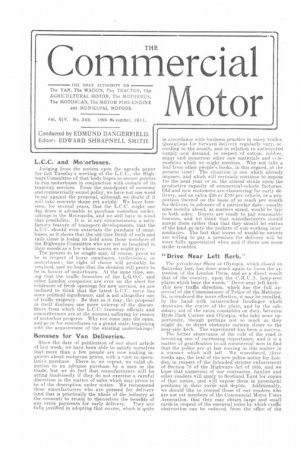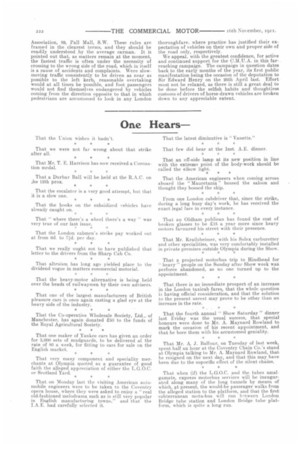L.C.C. and Motorbuses.
Page 1

Page 2

If you've noticed an error in this article please click here to report it so we can fix it.
Judging from the notices upon the agenda paper for last Tuesday's meeting of the L.C.C., the Highways Committee of that body hopes to secure powers to run motorbuses in conjunction with certain of its tramway services. From the standpoint of economy and commercially-sound policy, we have not one word to say against the proposal, although we doubt if it will take concrete shape yet awhile. We have foreseen, for several years, that the L.C.C. might one day deem it advisable to purchase motorbus undertakings in the Metropolis, and we still have in mind that possibility. -11. is, in any circumstances, a satisfactory feature of transport developments, that the L.C.C. should even entertain the purchase of omnibuses, as it shows that the old-time fetish of rails and rails alone is losing its hold upon those members of the Highways Committee who are not so fanatical in their moods as a few whose names we might give. The powers to be sought may, of course, prove to be in respect of horse omnibuses, trolleybuses, or motorbuses ; the right of choice will probably be retained, and we hope that the decision will prove to be in favour of motorbuses. At the same time, seeing that the traffic branches of the L.G.O.C. and other London companies are ever on the alert for evidences of fresh openings for new services, we are inclined to think that the latest L.C.C. move has some political significance, and is not altogether one of traffic exigency. Be that as it may, the proposal in itself discloses one more outcrop of the discomfiture from which the L.C.C. tramway officials and committeemen are at the moment suffering by reason of motorbus progress. Why not come into the open, and go in for motorbuses on a grand scale, beginning with the acquirement of the existing undertakings?
Bonuses for Van Deliveries.
Since the date of publication of our short article of last week, we have been able to satisfy ourselves that more than a few people are now making inquiries about motorvan prices, with a view to speculative purchase. There is, we repeat, no valid objection to an advance purchase by a man in the trade, but we do feel that manufacturers will be acting inadvisedly if they do not exercise a careful discretion in the matter of sales which may prove to be of the description under noticeWe recommend those manufacturers who are pressed for delivery (and that is practically the whole of the industry at the moment) to retain to themselves the benefits of any extra payments for early delivery. They are fully justified in adopting that course, which is quite in accordance with business practice in many trades_ Quotations for forward delivery regularly vary, according to the month, and in relation to anticipated supply and demand, in respect of cotton, rubber, sugar and numerous other raw materials and c(
inmodities which we might mention. Why not take a leaf from other people's books, in this regard, at the present, time? The situation is one which already imposes, and which will certainly continue to impose for the next year or so, the utmost strain upon the productive capacity of commercial-vehicle factories. Old and new customers are clamouring for early delivery, and an extra LiO or 2100 per vehicle, or a proportion thereof on the basis of so much per month for delivery in advance of aparticular date—usually nine months ahead, as matters stand, would be fair to both sides. Buyers are ready to pay reasonable bonuses, and we think that manufacturers should accept them rather than that they should let extras of the kind go into the pockets of non-working intermediaries. The fact that scores of would-be owners are willing to pay a premium for delivery will be more fully appreciated when and if there are more strike troubles.
"Drive Near Left Kerb."
The private-ear Show at Olympia, which closed on Saturday last, has done much again to focus the attention of the London Press, and as a direct result that of the country, upon the C.M.U.A. lamp-post plates which bear the words " Drive near left kerb.This new traffic direction, which has the full approval of the Commissioner of Police of the Metropolis, is rendered the more effective, it may be recalled, by the band with outstretched forefinger which decorates the centre of the plate, and by the subsidiary aid of the extra constables on duty, between Hyde Park Corner and Olympia, who take some opportunity, though perhaps not so much as they might do, to direct obstinate carmen closer to the near-side kerb. The experiment has been a success.
The better observance of the rule of the road is becoming_ one of increasing importance, and it is a matter of gratification to all commercial men to find that the police are at last moving in this matter in a manner which will tell. We reproduced, three weeks ago, the text of the new police notice for London, in respect of the intended stricter enforcement of Section 78 of the Highways Act of 1835, and we hope that numerous of our contractor, haulier and other readers will apply to Scotland Yard for copies of that notice, and will expose them in prominent positions in their yards and depots. Additionally, we should like to remind thoge of our readers who are not yet members of the Commercial Motor Users Association, that they may obtain large and small cards in respect of the essential rules by which traffic obstruction can be reduced, from the office of the Association, 89, Pall Mall, S.W. These rules are framed in the clearest terms, and they should be readily understood by the average carman. It is pointed out that, as matters remain at the moment, the fastest traffic is often under the necessity of crossing to the wrong side of the road, which in itself is a cause of accidents and complaints. Were slowmoving traffic consistently to be driven as near as possible to the left kerb, reasonable overtaking would at all times be possible, and foot passengers would not find themselves endangered by vehicles coming from the direction opposite to that in which pedestrians are accustomed to look in any London thoroughfare, where practice has justified their expectation of vehicles on their own and proper side of the road only, respectively. We appeal, with the greatest confidence, for active and continued support for the C.M.U.A. in this farreaching campaign. The campaign in question dates back to the early months of the year, its first public manifestation being the occasion of the deputation to Sir Edward Henry on the 26th April last. Effort must not be relaxed, as there is still a great deal to be done before the selfish habits and thoughtless customs of drivers of horse-drawn vehicles are broken down to any appreciable extent.
























